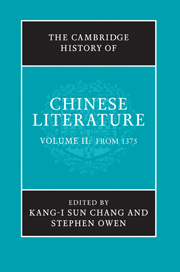Book contents
- Frontmatter
- Introduction to Volume II
- 1 Literature of the early Ming to mid-Ming (1375–1572)
- 2 The literary culture of the late Ming (1573–1644)
- 3 Early Qing to 1723
- 4 The literati era and its demise (1723–1840)
- 5 Prosimetric and verse narrative
- 6 Chinese literature from 1841 to 1937
- 7 Chinese literature from 1937 to the present
- Epilogue: Sinophone writings and the Chinese diaspora
- Select Bibliography
- Glossary
- Index
- References
Epilogue: Sinophone writings and the Chinese diaspora
Published online by Cambridge University Press: 28 May 2011
- Frontmatter
- Introduction to Volume II
- 1 Literature of the early Ming to mid-Ming (1375–1572)
- 2 The literary culture of the late Ming (1573–1644)
- 3 Early Qing to 1723
- 4 The literati era and its demise (1723–1840)
- 5 Prosimetric and verse narrative
- 6 Chinese literature from 1841 to 1937
- 7 Chinese literature from 1937 to the present
- Epilogue: Sinophone writings and the Chinese diaspora
- Select Bibliography
- Glossary
- Index
- References
Summary
The development of modern Chinese literature into a national tradition followed a tumultuous and innovative trajectory. In pursuit of a new relationship with the past and with the world, modern literature reinvented itself at several crucial junctures. Though at times precariously maintained, a unity has often been asserted out of a sense of nostalgia. This map of reading continues to change, however, as new visions of the geopolitical imagination abound in current Sinophone literature. With the potential to reshape the field in important ways, these visions have propelled new literary production in places that are neither monolingual nor nationally Chinese. Without converging on one cultural vision or a single aesthetics, current efforts to create alternative literary histories of the Chinese diaspora are introducing new questions while reinvigorating past debates. These efforts seek to extend the horizon of modern Chinese literature beyond the historical scope of this volume.
Though “Chinese-language literature” (huawen wenxue) is not unfamiliar to the Chinese-speaking world, it is only in recent years that scholars have begun to reevaluate its relationships with the different histories of literary production in Chinese communities throughout the world, mainly in Hong Kong, Malaysia, Singapore, Taiwan, Western Europe, and North America. The term “Chinese” encompasses conflicting notions of ethnicity, cultural affiliation, and linguistic center. Chinese, furthermore, is not the only language of the Chinese literary diaspora. If one were to consider this diaspora from within, the complex relation between indigenous and Han scripts in the making of minority literary traditions in the latter half of the twentieth century reveals a carefully planned process of assimilation rather than a history of a shared, natural language.
- Type
- Chapter
- Information
- The Cambridge History of Chinese Literature , pp. 706 - 714Publisher: Cambridge University PressPrint publication year: 2010
References
- 2
- Cited by



